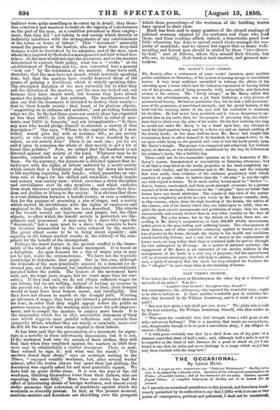SIR. RAMEY'S LAST LESSON.
Ma RAREY, after a retirement of some weeks' duration, gave another public exhibition on Saturday, of his system of taming savage or unsubdued horses. A very large audience assembled to witness the effects of his schooling upon a horse which had the infamous reputation of having killed one of his grooms, and of being generally wild, intractable, and therefore useless to his owners. The "lively savage," as Mr. Barey called this horse in his advertisements, was a jet black Galloway, a very picture of symmetrical beauty. He had no particular vice, but he had a full conscious- ness of the possession of unsubdued strength, and the proud bearing of his head and the burning lustre of his eyes told his resolution to maintain his freedom. He had never been mounted, and it was so dangerous to ap- proach him in his stable that, for the purpose of grooming him, his atten- dants had to climb over the sides of his stable. On his first entering the ring he would not suffer Mr. Barey to lay a hand upon him, any attempt to touch his hind quarters being met by a fierce cry and an instant outfling of the deadly hoofs ; in less than half-an-hour Mr. Barey had taught this tremendous horse to allow himself to be handled, to be jumped over, to be sat upon while lying on the ground, and even to rest his hoofs gently upon Mr. Rarey's temple. The savage was conquered and subjected, but without injury or distress, as was abundantly manifested by the way he followed at his subduer's heels, like a faithful dog.
There could not be two reasonable opinions as to the humanity of Mr. Rarey's system, demonstrated so successfully on Saturday afternoon ; but of all that is long-lived in the world, prejudice is the most completely en- dowed with vitality, and the questions put to Mr. Barry, and the remarks that were made, were evidence of the obstinate persistency with which numbers of people refuse to believe that.the " old plan" is not the right one with regard to horses. To be made useful, horses must be "broken"— that is, beaten, constrained, and their great strength overcome by a greater amount of brute strength ; believers in the " old plan" have no belief that horses have any moral attributes. The results of this view of the matter were very completely set forth in a few words by Mr. Barey—namely, that, in this country, where, from the high breeding of the horses, the nature of the climate, and of the duties which they are called upon to fulfil, they re- quire the most careful management and gentleness of usage, they are more unreasonably and cruelly treated than in any other country on the face of the globe. Not a day passes, but in the streets of London there are, ac- cording to Mr. Rarey's computation, at least 200,000 wholly unnecessary lashes given to the poor toiling and suffering horses. The consequences of these lashes, and of other cruelties commonly applied to horses, is a vast loss of power in the horse, through the injury to his health and condition which inevitably follows, and a vast loss of money in the replacement of horses worn out long before their time or rendered unfit for service through the vice endangered by ill-usage. As a matter of national economy, the engagement of Mr. Esrey as an instructor of our cavalry soldiers in the management of the horse is a real step of progress; but his appointment will be of moral advantage, for it will help to subdue, in great numbers of men, a spirit of savagery that has much too long retained its fondness for the " old plan" in more ways than in the breaking of horses.


























 Previous page
Previous page